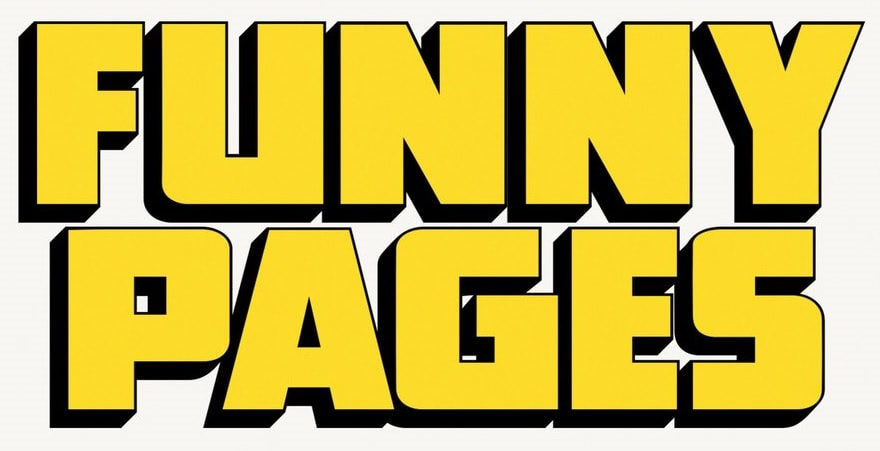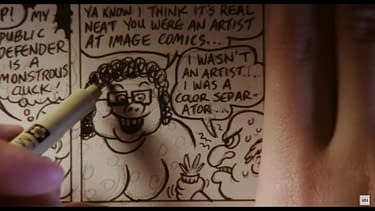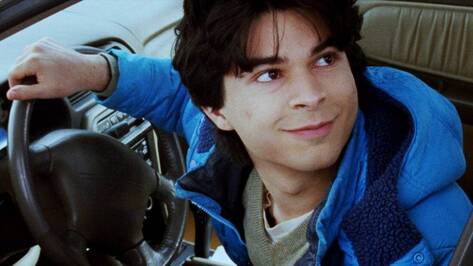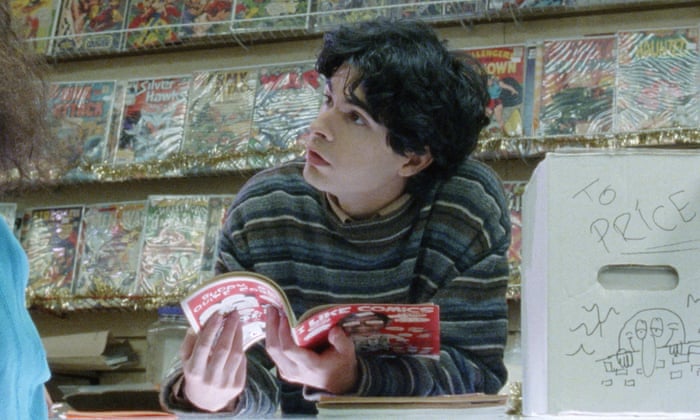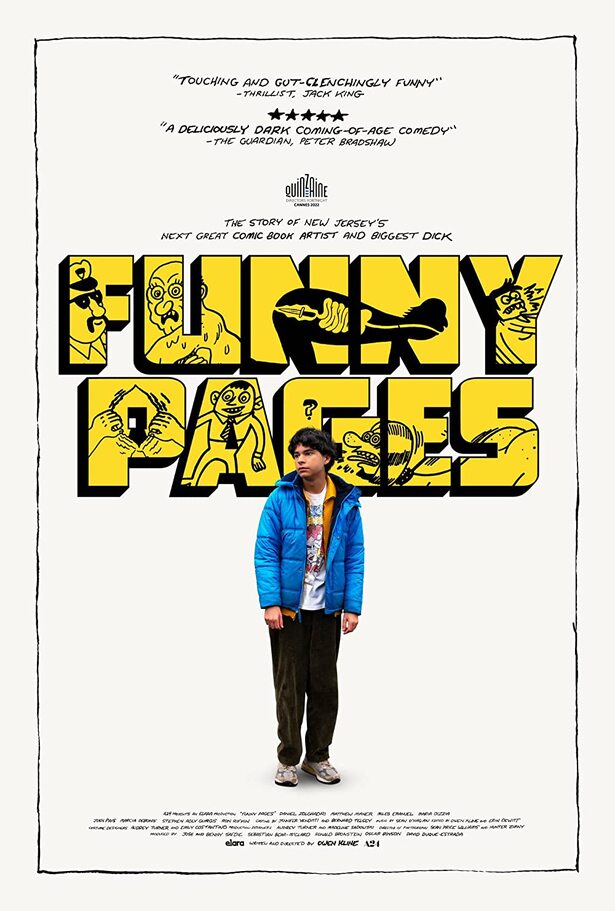
Reviewed by Vince Mancini | Uproxx
A lot of movies are funny, but very few are funny on a cellular level. Few announce themselves as something different from the very first frames. Even most good comedies are mostly built from familiar situations and people, but Funny Pages is that rare breed; bewildering and strange before its characters even begin speaking and projecting its inherent twistedness with every aspect of its construction. Owen Kline’s directorial debut, produced by the Safdie Brothers (Uncut Gems, Good Times), is an esoteric masterpiece, a woolly comedy of the bizarre oozing with rewatch potential.
Daniel Zolghadri plays our main character, Robert, a sort of Holden Caulfield by way of R. Crumb, determined to live out his dream of being a romantic, reclusive, dangerous cult cartoonist, in spite, or to spite his banal, upper-middle-class parents. In the first scene, he’s being showered with praise by his eccentric art teacher, who urges Robert to go further, to get weirder, to subvert more expectations with his vulgar, perverse little drawings.
Ah, those drawings, depicted lovingly in the otherwise grimy, grainy, fluorescent-lit scene. They nearly steal the show, managing to be cute despite depicting full penetration and squinting little buttholes, and laugh out loud hilarious to a frame (the twisted brilliance of Johnny Ryan, who drew them). Mr. Katano, a large lumpy slob who demands Robert caricature him in all his misshapen glory, is played by an actor named “Stephen Adly Guirgis,” a name that, like most aspects of Funny Pages, is self-evidently and almost inexplicably hilarious.
Every actor in Funny Pages is basically the visual equivalent of the sonic qualities of “Stephen Adly Guirgis,” human sight gags, dadaist celebrations of mother nature and all the ways she can be magical and capricious and inspired. Funny Pages’ achievement in unconventional casting choices may never be equaled. My friend Matt, who I brought to the screening with me, said every person in Funny Pages sort of looks like a grown-up Garbage Pail kid. There’s some truth to that, though I suspect Kline partly achieves this effect by opening with a montage of hilarious and semi-cruel caricatures. Such that, from that point on, you begin to envision every character you encounter in Funny Pages as their own inevitable visual parody, your brain filling the gaps on its own like an acid trip. It’s a brilliant and twisted trick that makes the audience complicit in Robert’s cruelty.
Yet also, maybe this cast of characters just looks more like a collection of R. Crumb drawings come to life than any cast ever has before. But it’s also more than that; they’re not just kooky for kooky’s sake, or deliberately gross, which has been done (see: The Greasy Strangler). These characters are both odd and odd looking in a way that seems to define a place.
The same way Napoleon Dynamite could only have been made with and by Mormons from Idaho, Funny Pages is a collection of types only found in the arcades and comic book shops of the suburbs of the tri-state area. And only filmmakers as authentically from that milieu as Owen Kline and the Safdies could depict these characters in this much detail and palpable veracity. I imagine this world it will be intimate for those who know it and impossibly exotic for those who don’t. I grew up in California, whose residents mostly seem milk-fed and focus-grouped by comparison, and the first time I encountered the particular types produced in Northern New Jersey and Long Island when I was in my twenties I thought I was in a Dali painting.
Robert, who seems determined to upset his conventional parents (who are well-meaning but intense in a way that you get at least an inkling why Robert finds them intolerable — played brilliantly by veterans Maria Dizzia and Ron Rifkin) chooses to seek his imagined life of grit and artistic danger in the exotic, far off land of Trenton, New Jersey. Which is always intoned with a mixture of awe and fear by Robert’s comic book store cohorts. “Trenton?? Trenton.”
Robert rents a cheap room in a sweaty basement next to a clanking water heater, populated by a handful of other oddballs, with shades of the six-and-a-half-floor from Being John Malkovich. Funny Pages is constantly riding the line between the banal and the absurd, always with a seasoned eye for the grotesque.
He soon meets Wallace, played by Michael Maher, one of Hollywood’s great weird guys who deserves legitimate Oscar consideration here. Robert is fascinated by Wallace, because Wallace used to work for Image Comics. He’s also a tortured personality, broken by the industry and mostly prickly towards everyone. Eventually, Robert comes to be torn between Wallace, a cruel, broken genius he partly idolizes but who treats Robert like dirt, and his high school best friend Miles, a pimply outcast with a Prince Valiant haircut (played by Miles Emanuel, who Owen Kline met when Emanuel showed up to a video store where Kline worked, to rent Ingmar Bergman’s Hour Of The Wolf with his babysitter when Emanuel was 11). Robert mostly treats Miles with the same dismissive contempt with which Wallace treats Robert.
It all comes to a head eventually, if not to a conclusion. And that’s okay, because Funny Pages is less an epic story than a lovingly crafted, exquisitely detailed portrait of a particular place and people, full of scenes that are largely ludicrous and impossible to forget. It’s an 87-minute lark, the kind of movie you want to frame and hang on the wall, the ultimate conversation piece.
A lot of movies are funny, but very few are funny on a cellular level. Few announce themselves as something different from the very first frames. Even most good comedies are mostly built from familiar situations and people, but Funny Pages is that rare breed; bewildering and strange before its characters even begin speaking and projecting its inherent twistedness with every aspect of its construction. Owen Kline’s directorial debut, produced by the Safdie Brothers (Uncut Gems, Good Times), is an esoteric masterpiece, a woolly comedy of the bizarre oozing with rewatch potential.
Daniel Zolghadri plays our main character, Robert, a sort of Holden Caulfield by way of R. Crumb, determined to live out his dream of being a romantic, reclusive, dangerous cult cartoonist, in spite, or to spite his banal, upper-middle-class parents. In the first scene, he’s being showered with praise by his eccentric art teacher, who urges Robert to go further, to get weirder, to subvert more expectations with his vulgar, perverse little drawings.
Ah, those drawings, depicted lovingly in the otherwise grimy, grainy, fluorescent-lit scene. They nearly steal the show, managing to be cute despite depicting full penetration and squinting little buttholes, and laugh out loud hilarious to a frame (the twisted brilliance of Johnny Ryan, who drew them). Mr. Katano, a large lumpy slob who demands Robert caricature him in all his misshapen glory, is played by an actor named “Stephen Adly Guirgis,” a name that, like most aspects of Funny Pages, is self-evidently and almost inexplicably hilarious.
Every actor in Funny Pages is basically the visual equivalent of the sonic qualities of “Stephen Adly Guirgis,” human sight gags, dadaist celebrations of mother nature and all the ways she can be magical and capricious and inspired. Funny Pages’ achievement in unconventional casting choices may never be equaled. My friend Matt, who I brought to the screening with me, said every person in Funny Pages sort of looks like a grown-up Garbage Pail kid. There’s some truth to that, though I suspect Kline partly achieves this effect by opening with a montage of hilarious and semi-cruel caricatures. Such that, from that point on, you begin to envision every character you encounter in Funny Pages as their own inevitable visual parody, your brain filling the gaps on its own like an acid trip. It’s a brilliant and twisted trick that makes the audience complicit in Robert’s cruelty.
Yet also, maybe this cast of characters just looks more like a collection of R. Crumb drawings come to life than any cast ever has before. But it’s also more than that; they’re not just kooky for kooky’s sake, or deliberately gross, which has been done (see: The Greasy Strangler). These characters are both odd and odd looking in a way that seems to define a place.
The same way Napoleon Dynamite could only have been made with and by Mormons from Idaho, Funny Pages is a collection of types only found in the arcades and comic book shops of the suburbs of the tri-state area. And only filmmakers as authentically from that milieu as Owen Kline and the Safdies could depict these characters in this much detail and palpable veracity. I imagine this world it will be intimate for those who know it and impossibly exotic for those who don’t. I grew up in California, whose residents mostly seem milk-fed and focus-grouped by comparison, and the first time I encountered the particular types produced in Northern New Jersey and Long Island when I was in my twenties I thought I was in a Dali painting.
Robert, who seems determined to upset his conventional parents (who are well-meaning but intense in a way that you get at least an inkling why Robert finds them intolerable — played brilliantly by veterans Maria Dizzia and Ron Rifkin) chooses to seek his imagined life of grit and artistic danger in the exotic, far off land of Trenton, New Jersey. Which is always intoned with a mixture of awe and fear by Robert’s comic book store cohorts. “Trenton?? Trenton.”
Robert rents a cheap room in a sweaty basement next to a clanking water heater, populated by a handful of other oddballs, with shades of the six-and-a-half-floor from Being John Malkovich. Funny Pages is constantly riding the line between the banal and the absurd, always with a seasoned eye for the grotesque.
He soon meets Wallace, played by Michael Maher, one of Hollywood’s great weird guys who deserves legitimate Oscar consideration here. Robert is fascinated by Wallace, because Wallace used to work for Image Comics. He’s also a tortured personality, broken by the industry and mostly prickly towards everyone. Eventually, Robert comes to be torn between Wallace, a cruel, broken genius he partly idolizes but who treats Robert like dirt, and his high school best friend Miles, a pimply outcast with a Prince Valiant haircut (played by Miles Emanuel, who Owen Kline met when Emanuel showed up to a video store where Kline worked, to rent Ingmar Bergman’s Hour Of The Wolf with his babysitter when Emanuel was 11). Robert mostly treats Miles with the same dismissive contempt with which Wallace treats Robert.
It all comes to a head eventually, if not to a conclusion. And that’s okay, because Funny Pages is less an epic story than a lovingly crafted, exquisitely detailed portrait of a particular place and people, full of scenes that are largely ludicrous and impossible to forget. It’s an 87-minute lark, the kind of movie you want to frame and hang on the wall, the ultimate conversation piece.
